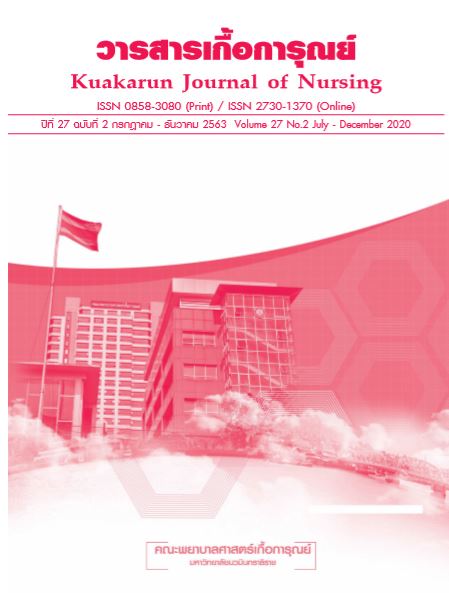กลยุทธ์เพื่อลดการตีตราทางสังคมในสถานการณ์โควิด 19
คำสำคัญ:
กลยุทธ์, การตีตราทางสังคม, โควิด 19บทคัดย่อ
การแพร่ระบาดของเชื้อไวรัสโคโรนา 2019 หรือ โควิด 19 นับเป็นปัญหาทางสาธารณสุขที่ส่งผลกระทบเป็นวงกว้างทั้งในด้านคุณภาพชีวิตของประชาชน สังคมและเศรษฐกิจของประเทศชาติ ท่ามกลางการแพร่ระบาดของโรค แต่ข้อมูลอย่างเป็นทางการเกี่ยวกับการแพร่ระบาดของโรคโควิด 19 มีอยู่อย่างจำกัด เนื่องจากเป็นโรคอุบัติใหม่ จึงทำให้คนส่วนใหญ่ในสังคมมีความวิตกกังวล หวาดระแวง กลัวว่าตนเองหรือบุคคลใกล้ชิดจะติดเชื้อ เกิดความสับสนในข้อมูลข่าวสาร จึงนำมาสู่การตีตราทางสังคม ผู้ที่ได้รับเชื้อหรือสงสัยว่าจะได้รับเชื้อจะถูกตำหนิ กล่าวโทษ กีดกันหรือปฏิเสธการอยู่ร่วมกัน ซึ่งมีผลกระทบต่อทั้งร่างกาย จิตใจ สังคม การดำเนินชีวิตและการประกอบอาชีพการงาน การลดการตีตราทางสังคมจึงเป็นสิ่งจำเป็น โดยใช้กลยุทธ์สำคัญ 4 ประการ คือ 1) ปรับทัศนคติของบุคคลในสังคม 2) สร้างแนวปฏิบัติที่ดีในวิถีชีวิตใหม่ 3) สร้างเครือข่ายสังคมที่เกื้อกูล และ 4) ส่งเสริมความรับผิดชอบต่อสังคม ซึ่งกลยุทธ์ดังกล่าวนี้จะช่วยลดการตีตราทางสังคม เป็นแนวปฏิบัติที่ดีในการอยู่ร่วมกัน เพิ่มคุณค่าและคุณภาพชีวิตของผู้ที่ได้รับเชื้อหรือสงสัยว่าได้รับเชื้อ
เอกสารอ้างอิง
Royal Thai Government Gazette. Announcement of the Ministry of Public Health on names and important symptoms of danger communicable diseases (Version 3) B.E. 2020, Royal Gazette Volume 137, Special Section 48 Ng. (2020 Feb 29). (in Thai)
World Health Organization. Coronavirus disease (COVID-19) situation report-171 [Internet]. 2020 [cited 2020 Jul 9]. Available from: https://www.who.int/docs/default-source/coronaviruse/ situation-reports/20200709-covid-19-sitrep-171.pdf?sfvrsn=9aba7ec7_2
Department of Disease Control. COVID-19 situation report [Internet]. 2020 [cited 2020 Jun 15]. Available from: https://covid19.ddc.moph.go.th/ (in Thai)
Bruns DP, Kraguljac NV, Bruns TR. Covid-19: facts, cultural considerations, and risk of stigmatization. Journal of Transcultural Nursing 2020;31(4):326–32.
Sotgiu G, Dobler CC. Social stigma in the time of Coronavirus Disease 2019. European Respiratory Journal 2020;56(2):2002461.
Ho CS, Chee CY, Ho RC. Mental health strategies to combat the psychological impact of COVID-19 beyond paranoia and panic. ANNALS Academy of Medicine Singapore 2020;49(1):155–60.
Abdelhafiz AS, Alorabi M. Social stigma: the hidden threat of COVID-19. Frontiers in Public Health 2020;8:1-4.
Bagcchi S. Stigma during the COVID-19 pandemic. The Lancet Infectious diseases 2020;20(7):782.
Bhattacharya P, Banerjee D, Rao TS. The “Untold” side of COVID-19: social stigma and its consequences in India. Indian Journal of Psychological Medicine 2020;42(4):382-86.
Dwinantoaji H, Sumarni DW. Human security, social stigma, and global health: the COVID-19 pandemic in Indonesia. Journal of the Medical Sciences 2020;52(3):74-81.
World Health Organization, UNICEF, IRPC. Social stigma associated with the Coronavirus Disease (COVID-19) [Internet]. 2020 [cited 2020 Apr 24]. Available from: https://www.who.int/docs/defaultsource/coronaviruse/covid19-stigma-guide.pdf?sfvrsn=226180f4_2
Brooks SK, Webster RK, Smith LE, Woodland L, Wessely S, Greenberg N, et al. The psychological impact of quarantine and how to reduce it: rapid review of evidence. The Lancet 2020;395(10227):912-20.
AlNaamani K, AlSinani S, Barkun AN. Medical research during the Covid-19 pandemic. World Journal of Clinical Cases 2020;8(15):3156–63.
Nochaiwong S, Ruengorn C, Awiphan R, Ruanta Y, Boonchieng W, Nanta S, et al. Mental health circumstances among health care workers and general public under the pandemic situation of COVID-19 (HOME-COVID-19). Medicine 2020;99(26):e20751.
Thai PBS News. Open 158 passengers information, if not quarantine, how much risk? [Internet]. 2020 [cited 2020 Apr 6]. Available from: https://news.thaipbs.or.th/content/290746 (in Thai)
Thairath Online. Getting ready! 1000 Pinoys from Korean to be back to Thailand this week [Internet]. 2020 [cited 2020 Mar 8]. Available from: https://www.thairath.co.th/news/ local/bangkok/1790049 (in Thai)
Thai Channel 3. Villagers not welcome recovered COVID-19 patients [Internet]. 2020 [cited 2020 Apr 4]. Available from: https://ch3thailandnews.bectero.com/news/180579 (in Thai)
Wongwichai C. Different human in the world (Disease): impact form social stigma of COVID-19 [Internet]. 2020 [cited 2020 Apr 26]. Available from: https://songsue.co/5577/ (in Thai)
Singh S, Bhutani S, Fatima H. Surviving the stigma: lessons learnt for the prevention of COVID-19 stigma and its mental health impact. Mental Health and Social Inclusion 2020;24(3):145-9.
Ministry of Public Health. Not stigmatizing COVID patients [Internet]. 2020 [cited 2020 Apr 25]. Available from: https://www.facebook.com/fanmoph/videos/2920410234695283/ (in Thai)
Naewna Online. Recover COVID patient won? Do not mind the infected. World health statistics point to just dead 3.4% [Internet]. 2020 [cited 2020 Apr 26]. Available from: https://www. naewna.com/local/489090 (in Thai)
Logie CH. Lessons learned from HIV can inform our approach to COVID-19 stigma. Journal of the International AIDS Society 2020;23(5):e25504.
Rao D, Elshafei A, Nguyen M, Hatzenbuehler ML, Frey S, Go VF. A systematic review of multi-level stigma interventions: state of the science and future directions. BMC Medicine 2019;17(1):1-11.
Cook JE, Purdie-Vaughns V, Meyer IH, Busch J. Intervening within and across levels: a multilevel approach to stigma and public health. Social Science & Medicine 2014;103:101-9.

















